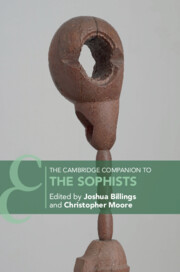Book contents
- The Cambridge Companion to the Sophists
- Other Volumes in the Series of Cambridge Companions
- The Cambridge Companion to the Sophists
- Copyright page
- Contents
- Contributors
- Note on the Text
- Introduction
- Part I Contexts
- 1 Sophia before the Sophists
- 2 The Sophists between Aristocracy and Democracy
- 3 The Professional Lives of the Sophists
- 4 The Sophists in the Fifth-Century Enlightenment
- Part II Thought
- Part III Receptions
- Appendix: The People of the Sophistic Period
- Select Bibliography
- Index
- OTHER VOLUMES IN THE SERIES OF CAMBRIDGE COMPANIONS (continued from page ii)
2 - The Sophists between Aristocracy and Democracy
from Part I - Contexts
Published online by Cambridge University Press: 23 December 2023
- The Cambridge Companion to the Sophists
- Other Volumes in the Series of Cambridge Companions
- The Cambridge Companion to the Sophists
- Copyright page
- Contents
- Contributors
- Note on the Text
- Introduction
- Part I Contexts
- 1 Sophia before the Sophists
- 2 The Sophists between Aristocracy and Democracy
- 3 The Professional Lives of the Sophists
- 4 The Sophists in the Fifth-Century Enlightenment
- Part II Thought
- Part III Receptions
- Appendix: The People of the Sophistic Period
- Select Bibliography
- Index
- OTHER VOLUMES IN THE SERIES OF CAMBRIDGE COMPANIONS (continued from page ii)
Summary
Known chiefly from sources related to democratic Athens, the Sophists emerge from the competitive ethos of aristocratic Greek society. The impetus for the Sophistic movement was the transformation of social and political relations within the Greek world following the defeat of Xerxes. These changes were most dramatically felt and best recorded at Athens. The phenomenal wealth of fifth-century Athens increased the number of Athenians aspiring to an aristocratic lifestyle and intensified the competition for social recognition and for preeminence in politics. Verbal dexterity was a key attribute in the pursuit of such standing. Sophists attracted students by promising to impart such skills in the young men of wealthy families. The turmoil of war in the late fifth century encouraged some of those influenced by Sophists to turn toward oligarchic revolution at Athens, tainting the reputation of Sophistic learning, leading to the condemnation of Socrates for his engagement with these self-proclaimed teachers of political virtue and wisdom.
- Type
- Chapter
- Information
- The Cambridge Companion to the Sophists , pp. 69 - 97Publisher: Cambridge University PressPrint publication year: 2023

